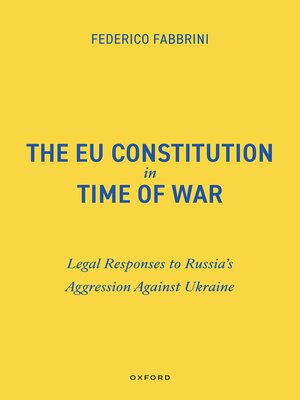The EU Constitution in Time of War
ebook ∣ Legal Responses to Russia's Aggression Against Ukraine
By Federico Fabbrini

Sign up to save your library
With an OverDrive account, you can save your favorite libraries for at-a-glance information about availability. Find out more about OverDrive accounts.
Find this title in Libby, the library reading app by OverDrive.



Search for a digital library with this title
Title found at these libraries:
| Library Name | Distance |
|---|---|
| Loading... |
Russia's illegal aggression against Ukraine has been a watershed moment for the European Union (EU). The return of large-scale conventional warfare to the European continent, unseen since the Second World War, shattered the illusion of perpetual peace and forced the EU to confront the reality of hard power. Originally created to maintain internal peace, the EU was never conceived to handle the challenges of war. Yet, the war in Ukraine required the EU to repurpose its machinery of government to do just that. Embracing a comparative analytical framework, this book examines how the EU constitution has functioned in response to Russia's aggression. It scrutinizes the EU's legal reactions across five key policy areas: foreign, security, and defence policy; economic and fiscal policy; justice and home affairs; energy and industrial policy; and enlargement and reform. In doing so, it investigates whether the EU constitution has enabled the EU to respond effectively to the war, how EU treaties have been interpreted to authorize war-related actions, and whether these responses have adhered to constitutional limits. Advancing a threefold argument, this book asserts that the EU constitution has demonstrated sufficient flexibility to permit wartime actions. Secondly, it highlights the limitations exposed by the return of conventional warfare in Europe, noting structural constraints and governance shortcomings that hinder decisive action, and instances where laws inadequately constrain EU action, particularly regarding fundamental rights and the rule of law. Finally, it evaluates the long-term constitutional implications of war for EU governance and proposes legal reforms that could shape a more perfect EU for both times of war and peace.







